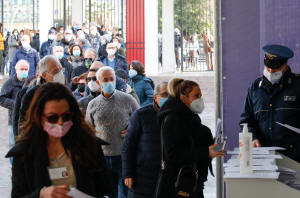Italy to extend COVID state of emergency to end of April
 Send a link to a friend
Send a link to a friend
 [January 13, 2021]
ROME (Reuters) - Italy will extend a
state of emergency imposed to curb the spread of the coronavirus until
the end of April as infections currently show no sign of abating, Health
Minister Roberto Speranza said on Wednesday. [January 13, 2021]
ROME (Reuters) - Italy will extend a
state of emergency imposed to curb the spread of the coronavirus until
the end of April as infections currently show no sign of abating, Health
Minister Roberto Speranza said on Wednesday.
The state of emergency, first introduced in January 2020, had been set
to expire at the end of this month. It gives greater powers to central
government, making it easier for officials to bypass the bureaucracy
that smothers much decision-making in Italy.
"In the past week there has been a generalised worsening of the
epidemic, we are back to an expansionary phase," Speranza told the lower
house of parliament.
"With indicators worsening... the government sees it appropriate to
extend the state of emergency to April 30."
Italy has registered 79,819 COVID-19 deaths since the pandemic first
erupted last February, the second-highest toll in Europe and the
sixth-highest in the world. The country has reported 2.303 million
COVID-19 cases to date.

"A strong new storm is mounting in Europe. The virus will be curbed with
vaccines but it will keep circulating with growing strength and can hit
us once again very badly," said Speranza.
"The coming months will be very difficult and we must not think that we
are out of danger," he said, adding that 12 Italian regions were at high
risk and eight at moderate risk.
TIERS OF RISK
After the Christmas holidays Italy returned to a three-tier system which
allows for different measures to be applied to different regions
according to infection levels.
[to top of second column]
|

People queue at a coronavirus disease (COVID-19) vaccination centre
in Naples, Italy, January 8, 2021. REUTERS/Ciro De Luca

The categories include high-risk, or red, areas, orange medium-risk
and yellow low risk districts.
At a cabinet meeting later on Wednesday ministers are expected to
agree new restrictions, including banning travel between Italy's 20
regions and take-aways from cafes. Nation-wide night curfews will
also be maintained.
Speranza said the government would introduce new "white zones" where
only 50 or fewer weekly cases of COVID-19 are registered for every
100,000 people. He did not say what rules would apply in those
zones.
Museums will be allowed to reopen in the low risk yellow zones for
the first time, Speranza added.
(Reporting by Claudia Cristoferi and Giulia Segreti; Editing by
Gareth Jones)
[© 2021 Thomson Reuters. All rights
reserved.] Copyright 2021 Reuters. All rights reserved. This material may not be published,
broadcast, rewritten or redistributed.
Thompson Reuters is solely responsible for this content.
 |